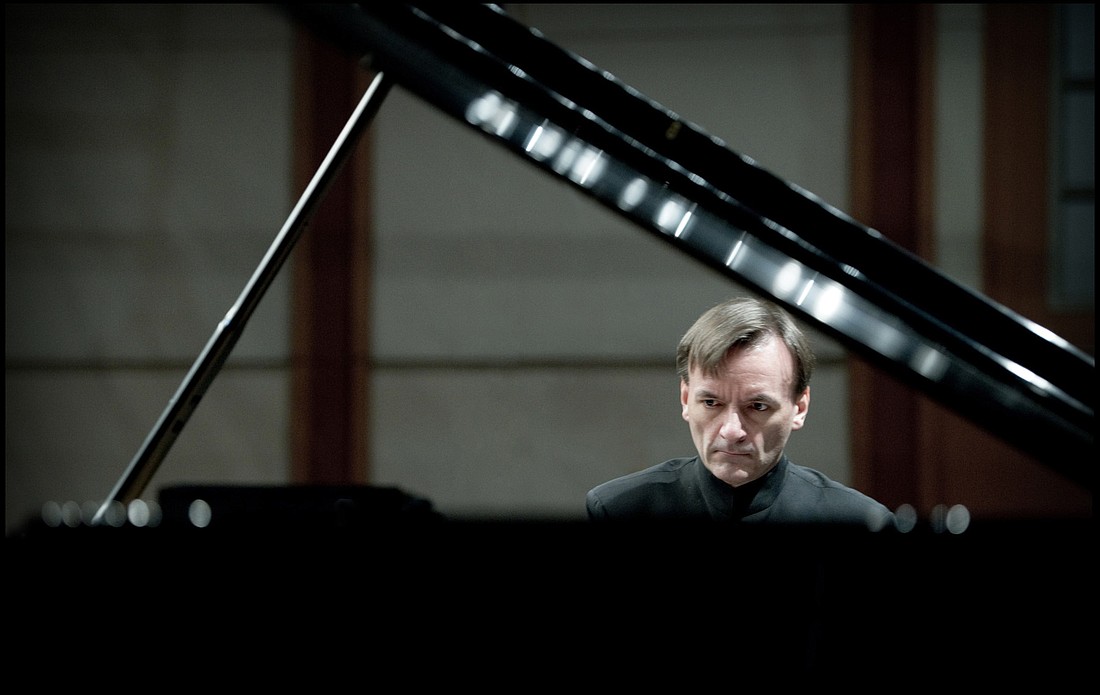- April 19, 2024
-
-
Loading

Loading

"Enigma" was the title of the Sarasota Orchestra’s Masterworks series this past weekend but, aside from the program featuring Elgar’s “Enigma Variations,” there was nothing perplexing about it.
Opening with Estonian composer Arvo Pärt’s “Cantus in Memory of Benjamin Britten,” we heard a sonorous Sarasota Orchestra playing music that is sheer simplicity embodying sophistication. Principal percussionist George Nickson began the work with the sound of a distant chime, a church bell, tolling a mournful death knell somewhere over the hill, that slowly came closer and closer while the strings of the orchestra played a simple downward minor scale. The sophistication came in the tempos each section played for this motif: the violins, for example, playing faster while the lower strings took up the toll at a much slower pace, enabling dissonances and resolutions that made ethereal colors, finally ending in a simple minor third.
Sounding a little like the opening of Britten’s “A Midsummer Night’s Dream,” the Pärt’s difficulty is in sustaining the sound and keeping the energy. The Sarasota Orchestra, led by Estonian Music Director Anu Tali, maintained both with an intensity that was spine-shivering.
Beethoven’s grand Piano Concerto No. 4 followed with Stephen Hough (pronounced Huff), the award-winning, international pianist, leading the way with the composer’s opening proclamation of few notes on the piano, developed by the orchestra so that the work sounds more like a chamber piece than a full-fledged concerto. Duets were passed from full ensemble to soloist, and Hough and Tali seemed fully glued at the hip, following each other seamlessly through the performance.
Hough is a clean, clear player, and he brings both important inner voices and obvious melodies out in a lucid, forthright manner that’s also imbued with emotion. In the second movement, for example, there was a beautifully thoughtout duet between the pianist and the orchestra, with the pianist whispering the connective tissue between the pronouncements of the orchestra and Tali finally bringing the soloist and ensemble together in one grand scheme.
The pianist occasionally took uncharacteristically grand pauses, especially in the cadenzas, but his intention seemed to be to emphasize the silences, making Beethoven’s monolithic qualities even more prominent. In fact, the cadenzas seemed to become gigantic sonatas in themselves, transforming the whole group — soloist, conductor and ensemble — into one organic body that was extremely satisfying.
But the great transformation came after intermission when Tali and the orchestra tackled Elgar’s “Enigma Variations.” With each of the sections written in honor of the composer’s friends, some by name, others by initial, this is a particularly personal piece. But to sit, program ahead, trying to decipher which friend is which, surely defeats the purpose. It’s the music — the great, sonorous, warm, action-packed, otherworldly, funny and moving music — that leads us to imagine our own friends and hear their voices through time.
Yes, there are some friends who are closer than others, Nimrod — written as a glorious adagio — speaks to us with more understanding and weight than some of the others. So does the cello solo (beautifully performed by acting principal Jake Muzzy) leading into the richness of the lower strings and a luscious, lushness of sound from the entire ensemble.
The transitions between the variations are as tricky as those between the Beethoven cadenzas and tutti sections. But Tali, again, made them so continuous and unified it was, except for the personalities of the friends, difficult to know there was an actual segue.
The encore was Nimrod, repeated. But, taken out of context, it was just that much slower than it had been within the complete work and, at that tempo, there was an elasticity of sound that tore at our hearts. John Milton described the moment in his poem, “Il Penseroso”: ”There let the pealing organ blow, To the full voiced choir below, In service high, and anthems clear, As may with sweetness, through mine ear, Dissolve me into ecstasies, And bring all Heav'n before mine eyes.”